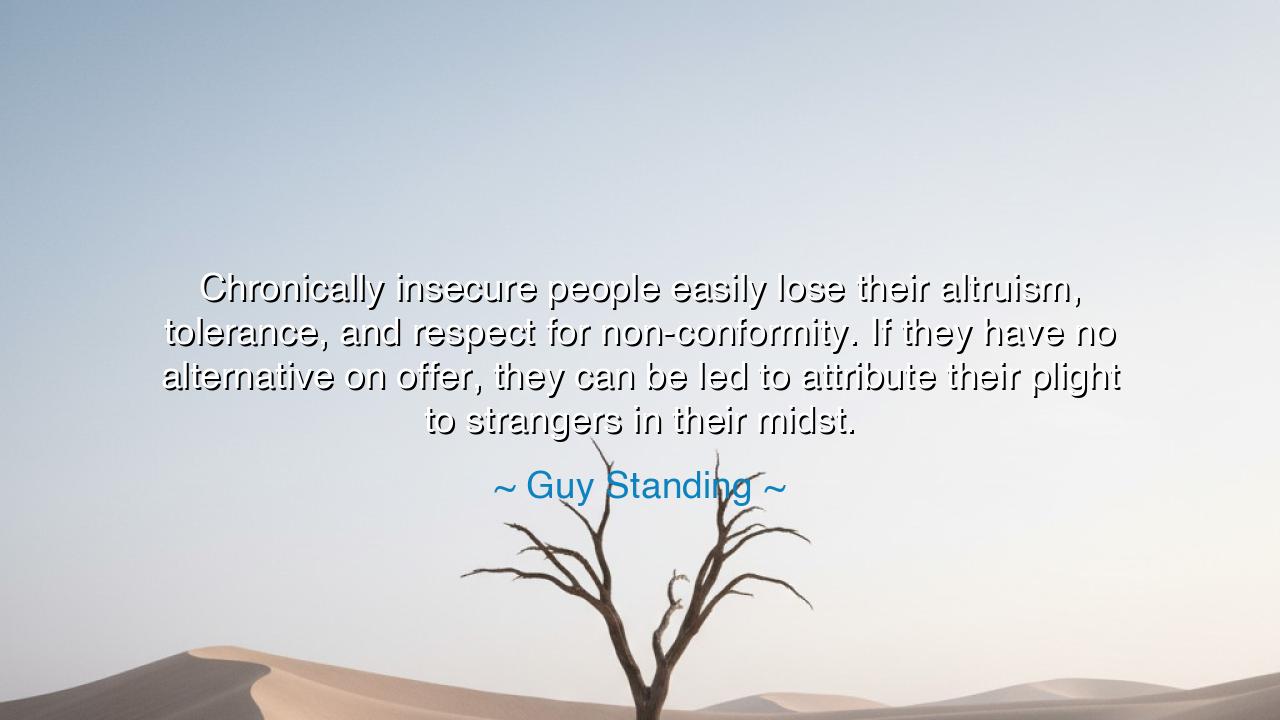
Chronically insecure people easily lose their altruism
Chronically insecure people easily lose their altruism, tolerance, and respect for non-conformity. If they have no alternative on offer, they can be led to attribute their plight to strangers in their midst.






The words of Guy Standing—“Chronically insecure people easily lose their altruism, tolerance, and respect for non-conformity. If they have no alternative on offer, they can be led to attribute their plight to strangers in their midst”—echo with the warning tone of an ancient oracle. They speak of the dark transformation that occurs when insecurity grips the soul of a person—or a nation. Insecurity, when prolonged and unhealed, corrodes the virtues that make us human. It turns compassion into suspicion, tolerance into resentment, and community into division. What begins as fear ends as blame, and the innocent become the scapegoats for the pain of the uncertain.
Throughout history, this truth has repeated like a tragic cycle. When people are left without stability, dignity, or hope, they grow vulnerable not only to despair but to manipulation. The mind, seeking order amidst chaos, looks outward for someone to blame. “It must be the stranger,” says the fearful heart, “it must be the outsider, the foreigner, the one who does not belong.” Thus are born the fires of prejudice and persecution. What Standing describes is not only a sociological pattern—it is the psychology of human fragility when faith in security is lost. The ancients knew this well: when famine came, when empires faltered, when the gods seemed silent, men turned upon one another to explain their suffering.
Consider the story of Germany after the First World War. The people, once proud, were left broken by defeat, their economy shattered, their livelihoods uncertain. Out of this chronic insecurity, a demagogue rose—one who promised renewal but fed on fear. He told the people that their suffering was not the result of war, greed, or circumstance, but of “strangers in their midst.” And so began one of humanity’s greatest tragedies, where millions were destroyed not for what they had done, but for what they represented in the minds of the fearful. In this, we see Standing’s wisdom unfold: when insecurity festers without remedy, hatred becomes a substitute for hope.
The philosopher Seneca once said that “fear is the seed of cruelty.” The insecure man, afraid of losing what little he has, lashes out at those who remind him of his own weakness. Insecurity breeds envy; envy breeds hatred. But the wise understand that the true enemy is not the stranger—it is the fear within. It is the unquiet heart that cannot accept its own uncertainty, the restless soul that must find fault beyond itself. Only by confronting this inner chaos can a person or a society reclaim its sense of altruism and tolerance.
Yet Guy Standing’s words also reveal a deeper compassion. He does not condemn the insecure—he pities them. For their anger is born not from evil, but from privation. He reminds us that insecurity is not only personal but structural—it is the product of inequality, of systems that deny stability to the many while protecting the few. When people are deprived of security—of work, of shelter, of belonging—they become easy prey to the rhetoric of division. Thus, the cure for hatred is not punishment, but justice. A society that provides security and dignity gives no fertile soil for fear to grow.
History gives us not only warnings but also lights of redemption. After the Second World War, Europe lay again in ruins. But instead of seeking new enemies, nations came together to build systems of cooperation—the European Union, the United Nations, the Welfare State—born from the realization that security breeds peace. They remembered that prosperity without compassion is fragile, and compassion without security is fleeting. It was an act of wisdom born from pain: to replace blame with solidarity, vengeance with rebuilding.
The lesson in Standing’s words is clear and timeless: do not let insecurity hollow out your humanity. When fear whispers that someone else must be blamed for your hardship, silence it with reason and empathy. Strength is not found in exclusion, but in understanding. The heart that clings to hatred is one that has forgotten its own power to heal. If you would preserve your altruism, your tolerance, and your respect for difference, then tend first to the roots of your own insecurity. Build peace within, and you will not seek enemies without.
So, my child, remember this: every age is tested by fear, but only the courageous preserve their compassion. When the world feels uncertain, stand firm in your humanity. Be as the oak that weathers the storm—its roots deep in the soil of kindness, its branches wide with acceptance. For in times of fear, it is not might that saves us, but mercy. And when you feel the pull of suspicion or anger toward the stranger in your midst, look again, and see in their eyes a reflection of your own longing to belong. Only then will the cycle of insecurity be broken, and peace—both personal and collective—be restored.






AAdministratorAdministrator
Welcome, honored guests. Please leave a comment, we will respond soon